Psychosocial interventions to improve quality of life and emotional wellbeing for recently diagnosed cancer patients
- PMID: 23152241
- PMCID: PMC6457819
- DOI: 10.1002/14651858.CD007064.pub2
Psychosocial interventions to improve quality of life and emotional wellbeing for recently diagnosed cancer patients
Abstract
Background: A cancer diagnosis may lead to significant psychological distress in up to 75% of cases. There is a lack of clarity about the most effective ways to address this psychological distress.
Objectives: To assess the effects of psychosocial interventions to improve quality of life (QoL) and general psychological distress in the 12-month phase following an initial cancer diagnosis.
Search methods: We searched the Cochrane Central Register of Controlled Trials (CENTRAL) (The Cochrane Library 2010, Issue 4), MEDLINE, EMBASE, and PsycINFO up to January 2011. We also searched registers of clinical trials, abstracts of scientific meetings and reference lists of included studies. Electronic searches were carried out across all primary sources of peer-reviewed publications using detailed criteria. No language restrictions were imposed.
Selection criteria: Randomised controlled trials of psychosocial interventions involving interpersonal dialogue between a 'trained helper' and individual newly diagnosed cancer patients were selected. Only trials measuring QoL and general psychological distress were included. Trials involving a combination of pharmacological therapy and interpersonal dialogue were excluded, as were trials involving couples, family members or group formats.
Data collection and analysis: Trial data were examined and selected by two authors in pairs with mediation from a third author where required. Where possible, outcome data were extracted for combining in a meta-analyses. Continuous outcomes were compared using standardised mean differences and 95% confidence intervals, using a random-effects model. The primary outcome, QoL, was examined in subgroups by outcome measurement, cancer site, theoretical basis for intervention, mode of delivery and discipline of trained helper. The secondary outcome, general psychological distress (including anxiety and depression), was examined according to specified outcome measures.
Main results: A total of 3309 records were identified, examined and the trials subjected to selection criteria; 30 trials were included in the review. No significant effects were observed for QoL at 6-month follow up (in 9 studies, SMD 0.11; 95% CI -0.00 to 0.22); however, a small improvement in QoL was observed when QoL was measured using cancer-specific measures (in 6 studies, SMD 0.16; 95% CI 0.02 to 0.30). General psychological distress as assessed by 'mood measures' improved also (in 8 studies, SMD - 0.81; 95% CI -1.44 to - 0.18), but no significant effect was observed when measures of depression or anxiety were used to assess distress (in 6 studies, depression SMD 0.12; 95% CI -0.07 to 0.31; in 4 studies, anxiety SMD 0.05; 95% CI -0.13 to 0.22). Psychoeducational and nurse-delivered interventions that were administered face to face and by telephone with breast cancer patients produced small positive significant effects on QoL (in 2 studies, SMD 0.23; 95% CI 0.04 to 0.43).
Authors' conclusions: The significant variation that was observed across participants, mode of delivery, discipline of 'trained helper' and intervention content makes it difficult to arrive at a firm conclusion regarding the effectiveness of psychosocial interventions for cancer patients. It can be tentatively concluded that nurse-delivered interventions comprising information combined with supportive attention may have a beneficial impact on mood in an undifferentiated population of newly diagnosed cancer patients.
Conflict of interest statement
None
Figures
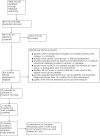
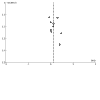
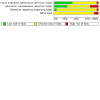
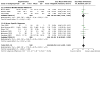
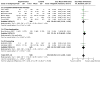
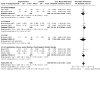
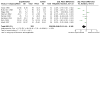
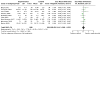
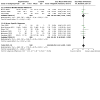
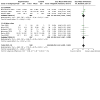
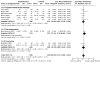
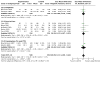
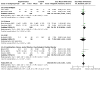
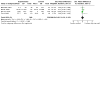
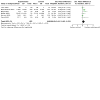
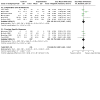
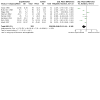
Update of
References
References to studies included in this review
Allard 2007 {published data only}
-
- Allard NC. Day surgery for breast cancer: effects of a psychoeducational telephone intervention on functional status and emotional distress. Oncology Nursing Forum 2007;34(1):133-41. - PubMed
Burton 1995 {published data only}
-
- Burton MV, Parker RW, Farrell A, Bailey D, Connelly J, Booth S, et al. A randomized controlled trial of preoperative psychological preparation for mastectomy. Psycho-Oncology 1995;4(1):1-19.
Chan 2005 {published data only}
-
- Chan YM, Lee PW, Fong DY, Fung AS, Wu LY, Choi AY, et al. Effect of individual psychological intervention in Chinese women with gynecologic malignancy: a randomized controlled trial. Journal of Clinical Oncology 2005;23(22):4913-24. - PubMed
Dow Meneses 2007 {published data only}
-
- Meneses KD, McNees P, Loerzel VW, Su X, Zhang Y, Hassey LA. Transition from treatment to survivorship: effects of a psychoeducational intervention on quality of life in breast cancer survivors. Oncology Nursing Forum 2007;34(5):1007-16. - PubMed
Downe‐Wamboldt 2007 {published data only}
-
- Downe-Wamboldt BL, Butler LJ, Melanson PM, Coulter LA, Singleton JF, Keefe JM, et al. The effects and expense of augmenting usual cancer clinic care with telephone problem-solving counseling. Cancer Nursing 2007;30(6):441-53. - PubMed
Edgar 2001 {published data only}
-
- Edgar L, Rosberger Z, Collet JP. Lessons learned: Outcomes and methodology of a coping skills intervention trial comparing individual and group formats for patients with cancer. International Journal of Psychiatry in Medicine 2001;31(3):289-304. - PubMed
Fawzy 1995 {published data only}
-
- Fawzy NW. A psychoeducational nursing intervention to enhance coping and affective state in newly diagnosed malignant melanoma patients. Cancer Nursing 1995;18(6):427-38. - PubMed
Forester 1985 {published data only}
-
- Forester B, Kornfeld DS, Fleiss JL. Psychotherapy during radiotherapy: effects on emotional and physical distress. American Journal of Psychiatry 1985;142(1):22-7. - PubMed
Holtedahl 2005 {published data only}
-
- Holtedahl K, Norum J, Anvik T, Richardsen E. Do cancer patients benefit from short-term contact with a general practitioner following cancer treatment? A randomised controlled study. Supportive Care in Cancer 2005;13(11):949-56. - PubMed
Jacobsen 2002 {published data only}
-
- Jacobsen PB, Meade CD, Stein KD, Chirikos TN, Small BJ, Ruckdeschel JC. Efficacy and costs of two forms of stress management training for cancer patients undergoing chemotherapy. Journal of Clinical Oncology 2002;20(12):2851-62. - PubMed
Johansson 2008 {published data only}
Kanzaki 2002 {published data only}
-
- H Kanzaki, Y Kido. [Cognitive-behavioral interventions for gastrectomy patients with the early stage of gastric cancer -- weekly counseling and journal writing targeted to self-efficacy and psychological stress]. [Japanese]. Nihon Kango Kagakkai Shi [Journal of Japan Academy of Nursing Science] 2002;22:1-10.
Lee 2006 {published data only}
-
- Lee V, Cohen SR, Edgar L, Laizner AM, Gagnon AJ. Meaning-making intervention during breast or colorectal cancer treatment improves self-esteem, optimism, and self-efficacy. Social Science & Medicine 2006;62(12):3133-45. - PubMed
Lev 2000 {published data only}
-
- Lev EL, Owen SV. Counseling women with breast cancer using principles developed by Albert Bandura. Perspectives in Psychiatric Care 2000;36(4):131-8. - PubMed
Linn 1981 {published data only}
-
- Linn BS, Linn MW. Late stage cancer patients: age differences in their psychophysical status and response to counseling. Journal of gerontology 1981;36(6):689-92. - PubMed
Manne 2007 {published data only}
-
- Manne SL, Edelson M, Bergman C, Carlson J, Rubin S, Rosenblum N, et al. Coping and communication-enhancing intervention versus supportive counselling for women diagnosed with gynecological cancers. Journal of Counselling and Clinical Psychology 2007;75(4):615-28. - PubMed
McArdle 1996 {published data only}
McQuellon 1998 {published data only}
-
- McQuellon RP, Wells M, Hoffman S, Craven B, Russell G, Cruz J, et al. Reducing distress in cancer patients with an orientation program. Psycho-Oncology 1998;7(3):207-17. - PubMed
Mishel 2002 {published data only}
-
- Mishel MH, Belyea M, Germino BB, Stewart JL, Bailey DE, Robertson C, et al. Helping patients with localized prostate carcinoma manage uncertainty and treatment side effects: nurse-delivered psychoeducational intervention over the telephone. Cancer 2002;94(6):1854-66. - PubMed
Moynihan 1998 {published data only}
Nezu 2003 {published data only}
-
- Nezu AM, Nezu CM, Felgoise SH, McClure KS, Houts PS. Project Genesis: assessing the efficacy of problem-solving therapy for distressed adult cancer patients. Journal of Consulting & Clinical Psychology 2003;71(6):1036-48. - PubMed
Parker 2009 {published data only}
Petersen 2002 {published data only}
-
- Petersen RW, Quinlivan JA. Preventing anxiety and depression in gynaecological cancer: a randomised controlled trial. BJOG: an international journal of obstetrics and gynaecology 2002;109(4):386-94. - PubMed
Pitcheathly 2008 {published data only}
-
- Pitcheathly C, Maguire P, Fletcher I, Parle M, Tomenson B, Creed F. Can a brief psychological interevntion prevent anxiety or depressive disorders in cancer patients? A randomised controlled trial. Annals of Oncology 2009;20:928-34. - PubMed
Puig 2006 {published data only}
-
- Puig A, Lee SM, Goodwin L, Sherrard PAD. The efficacy of creative arts therapies to enhance emotional expression, spirituality, and psychological well-being of newly diagnosed Stage I and Stage II breast cancer patients: A preliminary study. Arts in Psychotherapy 2006;33(3):218-28.
Ross 2005 {published data only}
-
- Ross L, Thomsen BL, Karlsen RV, Boesen EH, Johansen C. A randomized psychosocial intervention study on the effect of home visits on the well-being of Danish colorectal cancer patients--the INCA Project. Psycho-Oncology 2005;14(11):949-61. - PubMed
Sandgren 2000 {published data only}
-
- Sandgren AK, McCaul KD, King B, O'Donnell S, Foreman G. Telephone therapy for patients with breast cancer. Oncology Nursing Forum 2000;27(4):683-8. - PubMed
Sandgren 2003 {published data only}
-
- Sandgren AK, McCaul KD. Short-term effects of telephone therapy for breast cancer patients. Health Psychology 2003;22(3):310-5. - PubMed
Sandgren 2007 {published data only}
-
- Sandgren AK, McCaul KD. Long-term telephone therapy outcomes for breast cancer patients. Psycho-Oncology 2007;16(1):38-47. - PubMed
Scholten 2001 {published data only}
-
- Scholten C, Weinländer G, Krainer M, Frischenschlager O, Zielinski CC. Difference in patient's acceptance of early versus late initiation of psychosocial support in breast cancer. Supportive Care in Cancer 2001;9(6):459-64. - PubMed
Scura 2004 {published data only}
-
- Scura KW, Budin W, Garfing E. Telephone social support and education for adaptation to prostate cancer: a pilot study. Oncology Nursing Forum 2004;31(2):335-8. - PubMed
Stanton 2005 {published data only}
-
- Stanton AL, Ganz PA, Kwan L, Meyerowitz BE, Bower JE, Krupnick JL, et al. Outcomes from the Moving Beyond Cancer psychoeducational, randomized, controlled trial with breast cancer patients. Journal of Clinical Oncology 2005;23(25):6009-18. - PubMed
Trask 2003 {published data only}
-
- Trask PC, Paterson AG, Griffith KA, Riba MB, Schwartz JL. Cognitive-behavioral intervention for distress in patients with melanoma: comparison with standard medical care and impact on quality of life. Cancer 2003;98(4):854-64. - PubMed
Additional references
Arving 2011
-
- Arving C, Holmström I. Creating a new profession in cancer nursing? Experiences of working as a psychosocial nurse in cancer care. Journal of Clinical Nursing 2011;20:2939-47. - PubMed
Berlin 1995
-
- Berlin JA. Benefits of heterogeneity in meta-analysis of data from epidemiologic studies. American Journal of Epidemiology 1995;142(4):383-7. - PubMed
Campbell 2004
-
- Campbell HS, Phaneuf MR, Deane K. Cancer peer support programs: do they work? Patient Education and Counseling 2004;55:3-15. - PubMed
Chan 2012
-
- Chan R, Webster J, Marquart L. A systematic review: The effects of orientation programs for cancer patients and their family/carers. International Journal of Nursing Studies 2012;Early Online View doi:10.1016/j.ijnurstu.2012.03.002. - PubMed
Coleman 2011
-
- Coleman N, Hession N, Connolly A. Psycho-oncology best practice guidelines and a service perspective:conceptualising the fit and towards bridging the gap. The Irish Journal of Psychology 2011;32(1-2):72-89.
CONSORT 2010
-
- CONSORT. CONSORT Statement. www.consort-statement.org Accessed 5th May 2012.
Constanzo 2009
CRUK 2007
-
- Cancer Research UK. UK Cancer Incidence Statistics. www.cancerresearchuk.org Accessed 31st May 2007.
DoH 2004
-
- The NHS Cancer Plan and the new NHS: Providing a patient-centred service. Department of Health 2004:25.
Edwards 2004
Grande 2006
-
- Grande GE, Myers lB, Sutton SR. How do patients who participate in support groups differ from those who do not? Psycho-Oncology 2006;15:321-33. - PubMed
Hannes 2012
-
- Hannes K, Lockwood C. Synthesizing qualitative research: choosing the right approach. Oxford: Wiley-Blackwell, 2012.
Henselmans 2010
-
- Henselmans I, Helgeson VS, Seltman H, de Vries J, Sanderman R, Ranchor AV. Identification and prediction of distress trajectories in the first year after a breast cancer diagnosis. Health Psychology 2010;29(2):160-8. - PubMed
Jacobsen 2008
-
- Jacobsen PB, Jim HS. Psychosocial interventions for anxiety and depression in adult cancer patients: achievements and challenges. CA: a Cancer Journal for Clinicians 2008;58:214-30. - PubMed
Krizek 1999
-
- Krizek C, Roberts C, Ragan R, Ferrara JJ, Lord B. Gender and cancer support group participation. Cancer Practice 1999;7(2):86-92. - PubMed
Linden 2012
-
- Linden W, Grigis A. Psychological treatment outcomes for cancer patients: what do meta-analyses tell us about distress reduction? Psycho-Oncology 2012;21:343-50. - PubMed
Macmillan 2006
-
- Macmillan Cancer Support. Worried sick: the emotional impact of cancer. Report on survey carried out by Opinion Leader Research 2006.
Montgomery 2010
-
- Montgomery M, McCrone SH. Psychological distress associated with the diagnostic phase for suspected breast cancer: systematic review. Journal of Advanced Nursing 2010;66(11):2372-90. - PubMed
NCI 2007
-
- National Cancer Institute. Fact Sheet: Psychological Stress and Cancer. www.cancer.gov Accessed 29th May 2007.
Newell 2002
-
- Newell SA, Sanson-Fisher WR, Salvolainen NJ. Systematic review of psychological therapies for cancer patients: Overview and recommendations for future research. Journal of the Cancer Institute 2002;94(8):558-84. - PubMed
NICE 2004
-
- Improving supportive and palliative care for adults with cancer. National Institute of Excellence 2004:9.
Owen 2007
-
- Owen JE, Goldstein MS, Lee JH, Breen N, Rowland JH. Use of health-related and cancer-specific support groups among adult cancer survivors. Cancer 2007;109:2580-9. - PubMed
Sellick 1999
-
- Sellick SM, Crooks DL. Depression and cancer: an appraisal of the literature for prevalence, detection, and practice guideline development for psychological interventions. Psycho-Oncology 1999;8(4):315-33. - PubMed
Stanton 2006
-
- Stanton AL. Psychosocial concerns and interventions for cancer survivors. Journal of Clinical Oncology 2006;24(32):5132-7. - PubMed
Steginga 2008
-
- Steginga SK, Campbell A, Ferguson M, Beeden A, Walls M, Cairns W, Dunn, J. Socio-demographic, psychosocial and attitudinal predictors of help seeking after cancer diagnosis. Psycho-Oncology 2008;17:997-1005. - PubMed
Turton 2000
-
- Turton P, Cooke H. Meeting the needs of people with cancer for support and self-management. Complementary Therapies in Nursing and Midwifery 2000;6(3):130-7. - PubMed
Weich 2007
-
- Weich S, Morgan L, King M, Nazareth I. Attitudes to depression and its treatment in primary care. Psychological Medicine 2007;37:1239-48. - PubMed
Weis 2003
-
- Weis J. Support groups for cancer patients. Supportive Cancer Care 2003;11:763-76. - PubMed
Publication types
MeSH terms
LinkOut - more resources
Full Text Sources
Medical

